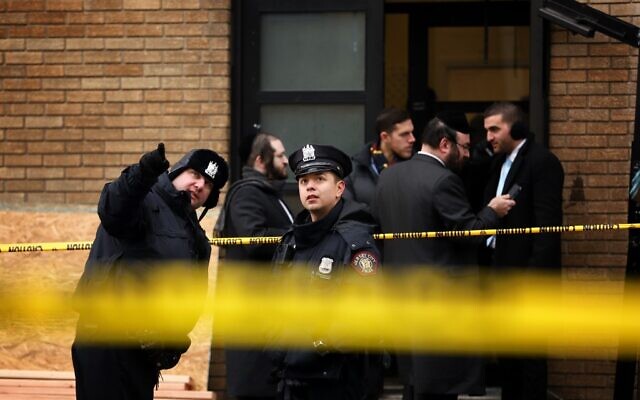Federal officials also say total hate crimes have reached highest level in more than a decade, as ADL warns true number is likely much higher.
By AGENCIES
The number of anti-Semitic hate crimes in the United States increased significantly in 2019, according to the FBI, in a year that saw three lethal attacks against Jews in the country.
Anti-Semitic incidents once again made up the majority of hate crimes based on religion.
In addition, federal officials recorded the highest number of hate-motivated killings since the FBI began collecting that data in the early 1990s, with the number of murders nationwide more than doubling the previous year.
The total number of hate crimes rose to the highest level in more than a decade.
The Anti-Defamation (ADL) League cautioned that the FBI’s numbers probably represent just a fraction of total hate crimes committed nationwide.
The FBI recorded 953 hate crimes against Jews in 2019, a 14 percent increase from the 835 recorded in 2018, and similar to the 938 recorded in 2017. In 2019, hate crimes against Jews constituted 62% of all hate crimes based on religion, slightly up from 58% in 2018 and 2017.
Last year saw a series of lethal anti-Semitic attacks that sparked fear and anxiety among American Jews. A synagogue shooting in Poway, California killed one person exactly six months after the 2018 synagogue shooting in Pittsburgh in which 11 Jews were murdered.
In December, a shooting in Jersey City, New Jersey that ended at a kosher supermarket killed two Jews and two others. Later that month, a stabbing at a Hanukkah party in Monsey, New York killed one. The New York-area attacks came amid a spate of anti-Semitic harassment and assaults in Orthodox neighborhoods in Brooklyn.
“When one individual is targeted by a hate crime, it hurts the whole community — that’s why people are feeling vulnerable and afraid,” ADL CEO Jonathan Greenblatt said in a statement.
The string of attacks last year came amid what the ADL has described as a years-long rise in anti-Semitic activity. Just days after 2020 began, 25,000 people marched across the Brooklyn Bridge to protest anti-Semitism in New York City and elsewhere.
Earlier this year, the ADL found, similarly to the FBI, that anti-Semitic incidents rose by 12% in 2019 (its methodology differs from the FBI’s).
The FBI recorded 7,314 total hate crimes last year, a slight increase over 2018 and 2017, and a sharp rise from the 5,850 recorded in 2015. As in previous years, the majority were based on race. African-Americans experienced the most hate crimes, 1,930. Hate crimes based on religion made up around 20% of total hate crimes.
It also saw a huge increase in hate crime murders, from 24 in 2018 to 51 in 2019. That includes the mass shooting at a Walmart in El Paso, Texas, which killed 23 and wounded an additional 23. The shooter wrote in a manifesto that he was acting against a Hispanic “invasion.”
The ADL said that the FBI numbers are almost certainly a significant undercount of the true number of hate crimes in the United States. That is because many municipalities do not submit hate crime data to the FBI. According to the ADL, 86% of participating agencies reported no hate crimes to the FBI, including 71 cities with populations greater than 100,000. The ADL also said the number of agencies reporting hate crimes to the FBI has declined year over year.
“We also need to remove the barriers that too often prevent people in marginalized communities – the individuals most likely to suffer hate crimes – from reporting hate-based incidents in the first instance,” Greenblatt said in a statement.
Source: The Times of Israel
